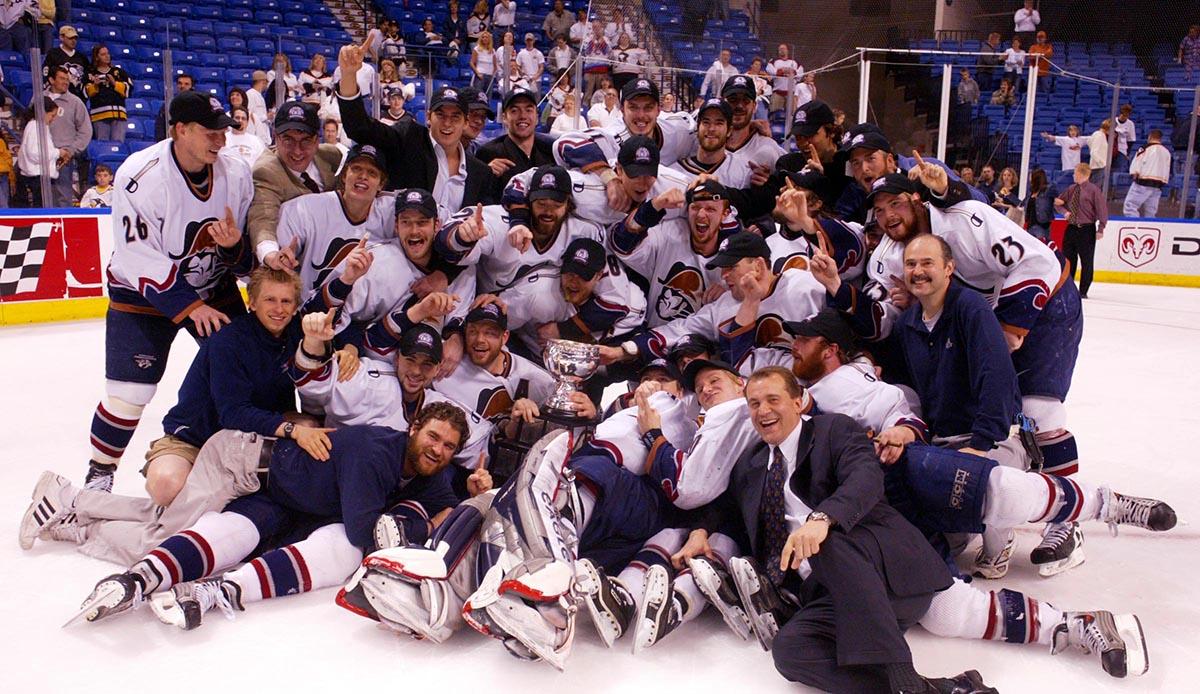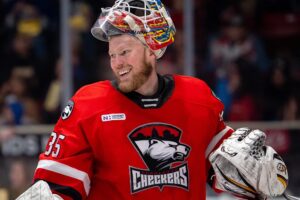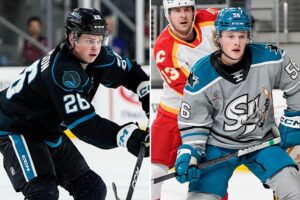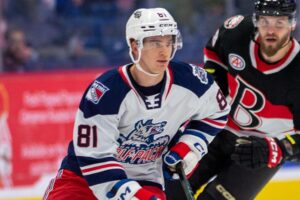by Jason Karnosky || AHL On The Beat Archive
Recently inducted Hockey Hall of Fame coach Fred Shero once wrote on a dressing room chalkboard prior to Philadelphia winning its first Stanley Cup: “Win today and we walk together forever.”
The same can be said for a determined group of players, coaches and management that made up the 2003-04 Milwaukee Admirals, a team that captured the successful franchise’s first playoff championship.
“Winning a Calder Cup in my first year was unbelievable,” said current San Antonio Rampage defenseman Greg Zanon, then an Admirals rookie. “I still have some close relationships with teammates from my years in Milwaukee. Whenever you win a championship it brings everybody a lot closer.”
A decade later, the majority of that team has moved on in different directions. Some players enjoyed lengthy careers in the National Hockey League (Zanon, Vern Fiddler, Scottie Upshall), while others pursued extended stints primarily in the American Hockey League (Darren Haydar, Mathieu Darche and Brandon Segal). A few more players rounded out their careers playing professionally in Europe (Curtis Murphy, Libor Pivko and Jay Henderson), while a handful of established veterans (Tony Hrkac, Wade Flaherty and Brad Tiley) played only a couple more years before hanging up their skates for good.
Yet 2004’s winning experience played an important role in shaping the careers of everyone involved in Milwaukee’s magical spring.
“My favorite memories from my time with Milwaukee was winning the 2004 Calder Cup and going back to the finals in 2006,” said then-head coach Claude Noel, who is now guiding the Winnipeg Jets. “Those two years we had a lot of success, the fans were great and winning always brings great things.”
Among the players that starred on that team, the offensive wizard that stood out above the rest was a former ninth-round draft pick named Darren Haydar. In 2002-03, Haydar claimed the AHL’s Rookie of the Year award, but it was the Milton, Ont., native’s performance the following postseason that proved most memorable.
Haydar led Milwaukee’s Calder Cup team with 11 goals and 26 playoff points in 2004.
“Just the group of guys we had that year was pretty special,” said Haydar. “To be able to win the Calder Cup, especially in my second year after my first year personally went well is something I’ll always remember.”
Noel knew what kind of asset the Admirals had in their top scorer that season.
“[Darren] was a very intelligent, dynamic player here in Milwaukee and he had some great years,” Noel said. “He easily could have been the (playoff) MVP that Wade Flaherty was as he led the team in scoring during the playoffs.”
Two years later Haydar racked up 18 goals and 35 playoff points as the Admirals nearly won a second title. Haydar finally garnered his second AHL ring in 2007-08 with rival Chicago.
“I loved my time in Milwaukee,” reflected Haydar, who has racked up 292 goals and 788 points in 11 AHL seasons. “I played for some great coaches, played with great players, had an opportunity to win a championship. Those are memories they can’t take away from you.”
Leadership on and off the ice was of paramount importance to winning the title, and in Tiley, Flaherty and Hrkac among others, the Admirals had perfect veteran balance.
“We put together a team that had some veteran guys here to guide the [younger] players along the way,” Predators assistant general manager Paul Fenton said. “Those guys carried the load and were able to show the kids what was really going on.”
Fresh off a second lengthy NHL stint, Tony Hrkac came to Milwaukee in 2003-04 eager to show he still had plenty of game left. After a 20-goal, 59-point regular season, the then-36-year-old proved a perfect complement to the youngsters as the captain that contributed 20 playoff points.
“It was the closest team I’ve ever been a part of,” said Hrkac, who owns a collection of championship rings from the AHL, NHL (Dallas) and NCAA (University of North Dakota). “It takes time to build a team, but halfway through the year we really got on a roll. We had the confidence to beat anybody in the league.”
In goal Wade Flaherty was unbelievable, turning in what was likely the finest season of his remarkable 18-year professional career. After sharing goaltending duties with top prospect Brian Finley during the regular season, Flaherty refused to yield the Admirals’ net as he backstopped the Calder Cup run.
“[Wade] understood during the year Nashville had to bring along Finley,” Hrkac said. “But the bottom line is when you’re going for a championship you play your best players no matter what. He was a big part of that team and we were very confident playing with him in the net.”
As the Admirals entered uncharted waters, Flaherty played the role of impenetrable Old Ironsides, posting a 21-12-3 record with a 2.18 goals-against average and .922 save percentage in the regular season. For his postseason efforts, the 35-year-old was rewarded with the Jack A. Butterfield Trophy as the most valuable player of the Calder Cup Playoffs.
“[Wade provided] a veteran presence back there with the calming affect that he had,” Fenton said. “Your goaltender is your backbone and he’d been through so many different wars over the years that he just calmed everybody down.”
Like Hrkac, veteran defenseman Curtis Murphy came to Milwaukee with championships on his resume. After capturing an NCAA title with North Dakota, Murphy won the final Turner Cup with the IHL’s Orlando Solar Bears in 2001, and claimed the Calder Cup with the Houston Aeros in 2003. In his only season in Milwaukee, the Kerrobert, Sask., native complemented young defensive partner Zanon, contributed 12 playoff points on his way to another title.
“We had a really good team and some veteran guys that had won (titles),” Noel said. “We had Tony Hrkac, who ended up winning here after winning a Stanley Cup with Dallas, and other (talented) older players.”
One of the most remarkable stories from Milwaukee’s run was the play of Vern Fiddler. An unknown quantity when he joined the Nashville organization in 2002-03, the undrafted free agent became a two-way force with a nasty streak. Fiddler became an important piece of the Nashville’s development puzzle and a big contributor during Milwaukee’s Calder Cup title run.
“Vern was hungry to show people that he belonged at a higher level,” Noel said. “He was a major contributor the season we won the Calder Cup. It was very evident that his will carried him not only to a contract with the Nashville Predators but eventually to a career in the NHL.”
Fiddler grew into a full-time NHL player, one who would post over 30 points in a season with both Nashville and later Phoenix before landing in Dallas, where he currently skates with the Stars.
Dependable, shot-blocking guru Zanon was also a little known quantity prior to his arrival in Milwaukee for the 2003-04 campaign. Despite taking some lumps as a healthy scratch during his first professional season, the Burnaby, B.C., native worked with Noel and assistant coach Todd Richards — now head coach of the Columbus Blue Jackets — to retool his game en route to a career that has seen him play nearly 500 games in the NHL.
“That first professional year in the AHL was a big jump,” Zanon said. “I was an offensive defenseman in college (with Nebraska-Omaha) and came here expecting the same kind of success, but it just wasn’t coming like it had in college. The coaches here took the time to teach me the defensive part of the game and it set me up for what I’ve done in my NHL career.”
The events of 2003-04 left a lasting impact on all of the players and organization as a whole, but the championship was hardly a blip on radar in terms of Milwaukee’s success as a franchise. Throughout its history dating back to 1977, Admirals fans have endured just three springs without postseason hockey, including an unrivaled streak of 40-plus wins dating back to 2003-04 and playoff appearances in every spring after Milwaukee’s inaugural AHL campaign in 2001-02.
It’s a history that future players are proud to be a part of.
“I think Milwaukee has lot of history and tradition as a franchise in both the AHL and earlier in the IHL, so they’ve seen a ton of great players go through there,” said Nashville goaltender Pekka Rinne, who nearly backstopped a second Milwaukee Calder Cup title in 2006. “I had an awesome time during my three years there, and it really felt like my second home.”






































